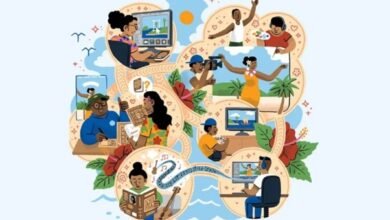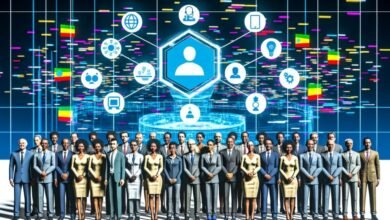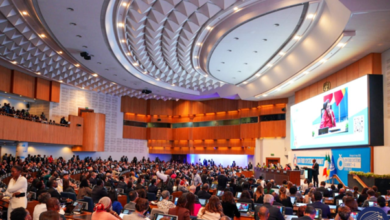eLearning Africa: the future of education rethought in Kigali
Kigali hosted eLearning Africa from May 11 to 13. Government policy makers, faculty members, digital educational content providers and others gathered to consider a new educational model for the fourth industrial revolution.
By Dounia Ben Mohamed in Kigali,
Photos and editing Hervé Mbaraga
With more than 1,000 delegates, 68 parallel sessions, 50 exhibition booths and 18 sector representatives, the 15th eLearning Africa conference, held May 11-13 in Kigali, brought together key players in the pan-African education ecosystem, opening up an array of thematic conversations and showcasing cutting edge learning technologies in Africa.
Lack of infrastructure, teacher training, adapting educational content to the new needs of the economy… These are challenges to which new technologies bring solutions
Interview Abdoulaye Mbengue, founder of TooShare
By consensus: the future of Africa depends on education. With a population expected to double by 2040, the continent is already struggling to provide quality education for all. It will have to face major challenges: lack of infrastructure, teacher training, adapting educational content to the new needs of the economy… These are all challenges to which new technologies can bring solutions. Knowing that 80% of today’s jobs will disappear in the years to come, with the emergence of artificial intelligence in particular, it is urgent to seize the opportunities offered by these technological solutions and adapt them to the realities and needs of the continent.
« These two problems arise in education: epistemic slavery and economic servitude »
This requires a complete overhaul of the educational models in force on the continent, as elsewhere. Philosopher Mogobe Ramose, guest of eLearning Africa, reminds us that there is no miracle solution to the systemic challenges of education in Africa and questions the very foundations of these systems. « The history of education in Africa, from the perspective of the colonial experience, has been not only to bring the conquered Africans out of darkness, but also to lead them into epistemic slavery. That’s not all. The conquered peoples were also led into economic slavery, which is still a very big problem today. These two problems arise in education: epistemic slavery and economic servitude, » says the former political refugee, who was exiled from South Africa during the apartheid regime.
It is for this reason that e-learning provides a major opportunity for the continent: while most of the textbooks used in schools are produced in the West, the new platforms that are multiplying, whether they are developed in Africa or elsewhere, are increasingly adapted to the needs of the continent. Through educational content that meets the expectations of African learners.
A market boosted by the pandemic
Interview Mike Feerick, CEO Alison
The EdTech market is already posting strong business growth. With a global turnover valued at 254.8 billion dollars in 2021, and which should more than double by 2027 (to 605.4 billion dollars), according to the specialized research firm Arizton, EdTech is now a market 8 times larger than the software sector. The Swiss organization Seedstars – which invests in young companies in emerging countries – estimates that 9% of the applications downloaded from the App Store today has educational content. It’s not surprising then that Africa too, boosted by the increased need for digitalization due to the COVID pandemic (school closures), is seeing an increase in e-learning offers.
An offer that grows as much as it diversifies
Interview Shashank Kapoor, Head of Global Sales Operations Cypher Learning
Online courses on African heritage, technical training on environmental jobs, motion design formula… The offer is growing as much as it is diversifying. Better still, the sector has the virtue of generating both jobs and income. Hence the interest of public players and donors in this sector, as well as the importance of global technology operators present on the continent.
Interview Clément Froger, Project Manager, Chaucot Dubost
One of the main lessons learned from the COVID-19 pandemic. While the majority of schools had to close, e-learning proved to be a real alternative if they had access to the Internet and digital educational platforms. The pandemic also reminded unequipped schools and universities of the urgency and the interest of a quick upgrade.
50% of the African teachers, trainers and educational technology specialists surveyed by e-learning Africa and EdTech Hub believe the COVID-19 pandemic represents a « significant » or « very significant » opportunity for education in Africa.
The survey findings released by eLearning Africa and EdTech Hub show that many African educators are optimistic about the future. They consider the COVID-19 to be a « wake-up call » that will encourage greater use of blended learning and new forms of technology-enhanced education and training in African schools, colleges and universities.
The survey entitled « Impact of the COVID-19 Pandemic on Education in Africa » is based on interviews with more than 1,600 education and technology professionals across the continent who were asked about their experiences with the COVID-19 crisis and its implications. 85% of respondents believe that the use of technology will be more widespread as a result of the crisis. This confirms a belief already on the African Union’s agenda, namely, that technology is seen as the key to the rapid expansion of education and, therefore, to the continent’s future economic growth.






